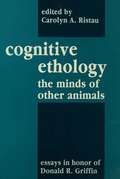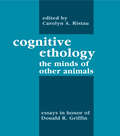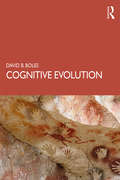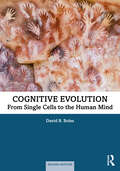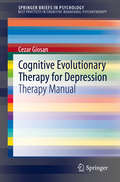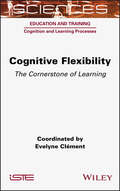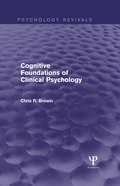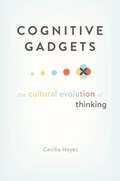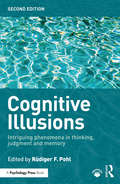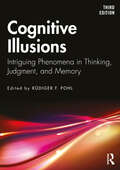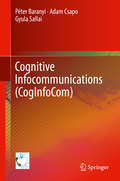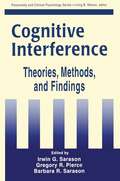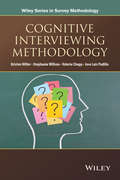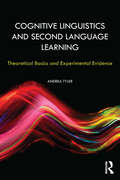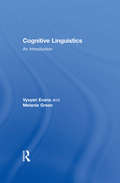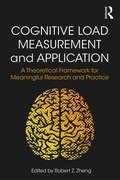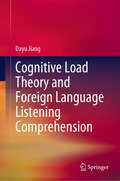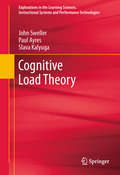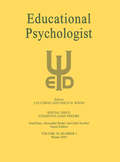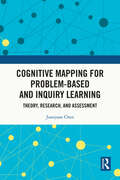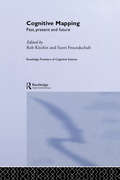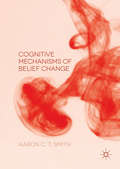- Table View
- List View
Cognitive Ethology: Essays in Honor of Donald R. Griffin (Comparative Cognition and Neuroscience Series)
by Donald R. Griffin Carolyn A. RistauThis collection of essays was written by former students, associates, admirers, critics and friends of Donald R. Griffin -- the creator of cognitive ethology. Stimulated by his work, this volume presents ideas and experiments in the field of cognitive ethology -- the exploration of the mental experiences of animals as they behave in their natural environment during the course of their normal lives. Cognitive Ethology discusses the possibility that animals may have abilities to experience, communicate, reason, and plan beyond those usually ascribed to them in a "black box" or "stimulus-response" interpretation of their behavior. Contributions from scientists who have been associated with or influenced by Griffin offer a lively array of views, some disparate from one another and some especially selected to present approaches contrary to his.
Cognitive Ethology: Essays in Honor of Donald R. Griffin (Comparative Cognition and Neuroscience Series)
by Donald R. GriffinThis collection of essays was written by former students, associates, admirers, critics and friends of Donald R. Griffin -- the creator of cognitive ethology. Stimulated by his work, this volume presents ideas and experiments in the field of cognitive ethology -- the exploration of the mental experiences of animals as they behave in their natural environment during the course of their normal lives. Cognitive Ethology discusses the possibility that animals may have abilities to experience, communicate, reason, and plan beyond those usually ascribed to them in a "black box" or "stimulus-response" interpretation of their behavior. Contributions from scientists who have been associated with or influenced by Griffin offer a lively array of views, some disparate from one another and some especially selected to present approaches contrary to his.
Cognitive Evolution
by David B. BolesCognitive Evolution provides an in-depth exploration of the history and development of cognition, from the beginning of life on Earth to present-day humans. Drawing together evolutionary and comparative research, this book presents a unique perspective on the evolution of human cognition. Adopting an information processing perspective – that is, from inputs to outputs, with all the mental processes in between, Boles provides a systematic overview of the evolutionary development of cognition and of its sensation, movement, and perception components. The book is supported by long-established evolutionary theories and backed up by a wealth of recent research from the growing field of cognitive evolution and cognitive neuroscience to provide a comprehensive text on the subject. Cognitive Evolution is an essential read for advanced undergraduates and postgraduate students of cognitive and evolutionary psychology.
Cognitive Evolution: From Single Cells to the Human Mind
by David B. BolesCognitive Evolution provides an in-depth exploration of the natural history of cognition, from the beginning of life on Earth to present-day humans. Drawing together evolutionary, comparative, and neuroscience research, the book brings a unique cognitive perspective to evolutionary psychology. The second edition features the latest research and illustrations on emerging topics, making it a true update of the field. After introducing evolution, Boles adopts an information processing perspective – from inputs to outputs, with all the mental processes in between to provide a systematic overview of the evolution of cognition, including its sensory, motoric, perceptual, and cognitive components. The combination of evolutionary, comparative, and neuroscience perspectives provides an insight on topics like vision, handedness, tools and planning, spatial perception, pattern recognition, memory, language, and consciousness. Cognitive Evolution is a comprehensive, essential read for advanced undergraduate and postgraduate students of cognitive and evolutionary psychology. Researchers will find it a useful and insightful synthesis of the field, yet even the curious public will find in it much that is surprising and enlightening.
Cognitive Evolutionary Therapy for Depression: Therapy Manual (SpringerBriefs in Psychology)
by Cezar GiosanEvolutionary psychology has recently made inroads in clinical psychology, bringing the understanding that, in some cases, mental symptoms are not manifestations of brain disorders, but rather evolved mechanisms that might function in overdrive or signal fitness problems. Thus, improvements in fitness may lead to improvements in those symptoms. Armed with such insights, this brief describes a comprehensive therapy protocol for depression – Cognitive Evolutionary Therapy (CET) –, which incorporates evolutionary understandings of this condition into well-validated cognitive techniques. CET starts with an evaluation of the evolutionary fitness of an individual, which represents the springboard for specific, evolutionary-driven behavioral and cognitive interventions. Based on the fitness evaluation, which takes place at intake, the CET therapist comes pre-equipped with a list of the patient’s fitness problems and can start working on them very early on in therapy, potentially leading to shorter interventions and cost savings. This brief will appeal to clinical psychologists and therapists who frequently employ CBT principles in therapy, as well as to clinicians who want to incorporate insights from evolutionary disciplines into their approaches.
Cognitive Flexibility: The Cornerstone of Learning
by Evelyne ClementCognitive flexibility is the cornerstone of learning and enables us to cope with a constantly changing environment. By adapting our knowledge and habits in order to respond to new situations, cognitive flexibility plays a fundamental role in learning.This book proposes a study of the fundamental notions of cognitive flexibility: its measurement and development, its links with metacognition and critical thinking and the role of context in its expression, as well as its involvement in discovering solutions, transferring knowledge and processing analogies.Convergent perspectives are also presented in order to paint a clear picture of cognitive flexibility and to discuss the issues at stake. Thanks to the combined views of specialists in cognitive and developmental psychology, Cognitive Flexibility suggests new educational possibilities based on the results of empirical work on the subject.
Cognitive Foundations of Clinical Psychology (Psychology Revivals)
by Chris R. BrewinOriginally published in 1988, this was the first textbook to review and integrate the cognitive theories underlying the practice of modern clinical psychology. Written in a clear and readable way, it uses many clinical examples to relate the theories to what therapists actually do. It describes the strengths and weaknesses of the theories and develops a common framework drawn from research in social and cognitive psychology to explain the mechanisms of behavioural and cognitive therapy. Among the topics covered are the validity of self-reports; experimental investigations of nonconscious processes; cognitive theories of conditioning; the relation between cognition and emotional disorders such as anxiety and depression; self-esteem and the development of self-schema; self-efficacy; explanation and causal attribution; personal values and goals; self-regulation and the techniques of cognitive therapy. This textbook is designed for advanced undergraduate and postgraduate courses in clinical and abnormal psychology. Its practical focus will also make it of particular interest to practising clinical psychologists, psychiatrists and other mental health professionals.
Cognitive Gadgets: The Cultural Evolution of Thinking
by Cecilia HeyesHow did human minds become so different from those of other animals? What accounts for our capacity to understand the way the physical world works, to think ourselves into the minds of others, to gossip, read, tell stories about the past, and imagine the future? These questions are not new: they have been debated by philosophers, psychologists, anthropologists, evolutionists, and neurobiologists over the course of centuries. One explanation widely accepted today is that humans have special cognitive instincts. Unlike other living animal species, we are born with complicated mechanisms for reasoning about causation, reading the minds of others, copying behaviors, and using language. Cecilia Heyes agrees that adult humans have impressive pieces of cognitive equipment. In her framing, however, these cognitive gadgets are not instincts programmed in the genes but are constructed in the course of childhood through social interaction. Cognitive gadgets are products of cultural evolution, rather than genetic evolution. At birth, the minds of human babies are only subtly different from the minds of newborn chimpanzees. We are friendlier, our attention is drawn to different things, and we have a capacity to learn and remember that outstrips the abilities of newborn chimpanzees. Yet when these subtle differences are exposed to culture-soaked human environments, they have enormous effects. They enable us to upload distinctively human ways of thinking from the social world around us. As Cognitive Gadgets makes clear, from birth our malleable human minds can learn through culture not only what to think but how to think it.
Cognitive Illusions: Intriguing Phenomena in Judgement, Thinking and Memory
by Rüdiger F PohlCognitive Illusions explores a wide range of fascinating psychological effects in the way we think, judge and remember in our everyday lives. Featuring contributions from leading researchers, the book defines what cognitive illusions are and discusses their theoretical status: are such illusions proof for a faulty human information-processing system, or do they only represent by-products of otherwise adaptive cognitive mechanisms? Throughout the book, background to phenomena such as illusions of control, overconfidence and hindsight bias are discussed, before considering the respective empirical research, potential explanations of the phenomenon, and relevant applied perspectives. Each chapter also features the detailed description of an experiment that can be used as classroom demonstration. <P><P>Featuring six new chapters, this edition has been thoroughly updated throughout to reflect recent research and changes of focus within the field. <P><P>This book will be of interest to students and researchers of cognitive illusions, specifically, those focusing on thinking, reasoning, decision-making and memory.
Cognitive Illusions: Intriguing Phenomena in Thinking, Judgment, and Memory
by Rüdiger F. PohlCognitive Illusions explores a wide range of fascinating psychological effects in the way we think, judge and remember in our everyday lives. In this volume, Rüdiger F. Pohl brings together leading international researchers to define what cognitive illusions are and discuss their theoretical status: are such illusions proof of a faulty human information-processing system, or do they only represent by-products of otherwise adaptive cognitive mechanisms? The book describes and discusses 26 different cognitive illusions, with each chapter giving a profound overview of the respective empirical research including potential explanations, individual differences, and relevant applied perspectives. This edition has been thoroughly updated throughout, featuring new chapters on negativity bias, metacognition, and how we respond to fake news, along with detailed descriptions of experiments that can be used as classroom demonstration in every chapter. Demonstrating just how diverse cognitive illusions can be, it is a must read for all students and researchers of cognitive illusions, specifically, those focusing on thinking, reasoning, decision-making, and memory.
Cognitive Impairment in Major Depressive Disorder
by McIntyre, Roger S. and Cha, Danielle S. Roger S. Mcintyre Danielle S. ChaMajor depressive disorder (MDD) is the leading cause of disability globally in both developed and developing nations. The staggering economic costs attributable to MDD are largely a consequence of impairment in role function. Evidence indicates that disturbance in the domain of cognitive function in individuals with MDD is the principal determinant of health outcome. This is the first book to comprehensively explore the domain of cognition in MDD. The literature describing cognitive dysfunction is reviewed with particular focus on clinical determinants, pathophysiology and causative factors. The patient subpopulations most susceptible are defined. A summary of contemporary assessment tools for research and clinical purposes is provided. Multimodality treatments and prevention strategies are described. This book is an invaluable resource for psychiatrists, neuropsychologists and other members of the mental health team, as well as for policy makers, vocation rehabilitation experts, disability providers and other stakeholders interested in improving health outcomes in MDD.
Cognitive Infocommunications (CogInfoCom)
by Péter Baranyi Adam Csapo Gyula SallaiThis book describes the theoretical foundations of cognitive infocommunications (CogInfoCom), and provides a survey on state-of-the-art solutions and applications within the field. The book covers aspects of cognitive infocommunications in research fields such as affective computing, BCI, future internet, HCI, HRI, sensory substitution, and virtual/augmented interactions, and also introduces newly proposed paradigms and initiatives under the field, including CogInfoCom channels, speechability and socio-cognitive ICT. The book focuses on describing the merging between humans and information and communications technology (ICT) at the level of cognitive capabilities with an approach towards developing future cognitive ICT.
Cognitive Interference: Theories, Methods, and Findings
by Irwin G. Sarason Barbara R. Sarason Gregory R. PierceIn this volume, the first synthesis of work on cognitive interference, leading researchers, theorists, and clinicians from around the world confront a number of important questions about intrusive thoughts and suggest a challenging agenda for the future.
Cognitive Interviewing Methodology
by Kristen Miller Jose Luis Padilla Stephanie Willson Valerie CheppAN INTERDISCIPLINARY PERSPECTIVE TO THE EVOLUTION OF THEORY AND METHODOLOGY WITHIN COGNITIVE INTERVIEW PROCESSESProviding a comprehensive approach to cognitive interviewing in the field of survey methodology, Cognitive Interviewing Methodology delivers a clear guide that draws upon modern, cutting-edge research from a variety of fields.Each chapter begins by summarizing the prevailing paradigms that currently dominate the field of cognitive interviewing. Then underlying theoretical foundations are presented, which supplies readers with the necessary background to understand newly-evolving techniques in the field. The theories lead into developed and practiced methods by leading practitioners, researchers, and/or academics. Finally, the edited guide lays out the limitations of cognitive interviewing studies and explores the benefits of cognitive interviewing with other methodological approaches. With a primary focus on question evaluation, Cognitive Interviewing Methodology also includes: Step-by-step procedures for conducting cognitive interviewing studies, which includes the various aspects of data collection, questionnaire design, and data interpretation Newly developed tools to benefit cognitive interviewing studies as well as the field of question evaluation, such as Q-Notes, a data entry and analysis software application, and Q-Bank, an online resource that houses question evaluation studies A unique method for questionnaire designers, survey managers, and data users to analyze, present, and document survey data results from a cognitive interviewing study An excellent reference for survey researchers and practitioners in the social sciences who utilize cognitive interviewing techniques in their everyday work, Cognitive Interviewing Methodology is also a useful supplement for courses on survey methods at the upper-undergraduate and graduate-level.
Cognitive Limitations in Aging and Psychopathology
by Randall W. Engle Grzegorz Sedek Ulrich Von Hecker Daniel N. McintoshThis book examines the major progress made in recent psychological science in understanding the cognitive control of thought, emotion, and behavior and what happens when that control is diminished as a result of aging, depression, developmental disabilities, or psychopathology. Each chapter of this volume reports the most recent research by a leading researcher on the international stage. Topics include the effects on thought, emotion, and behavior by limitations in working memory, cognitive control, attention, inhibition, and reasoning processes. Other chapters review standard and emerging research paradigms and new findings on limitations in cognitive functioning associated with aging and psychopathology. The explicit goal behind this volume was to facilitate cross-area research and training by familiarizing researchers with paradigms and findings in areas different from but related to their own.
Cognitive Linguistics and Second Language Learning: Theoretical Basics and Experimental Evidence (Second Language Acquisition Research Series)
by Andrea TylerThis book illustrates the ways that cognitive linguistics, a relatively new paradigm in language studies, can illuminate and facilitate language research and teaching. The first part of the book introduces the basics of cognitive linguistic theory in a way that is geared toward second language teachers and researchers. The second part of the book provides experimental evidence of the usefulness of applying cognitive linguistics to the teaching of English. Included is a thorough review of the existing literature on cognitive linguistic applications to teaching and cognitive linguistic-based experiments. Three chapters report original experiments which focus on teaching modals, prepositions and syntactic constructions, elements of English that learners tend to find challenging. A chapter on “future directions” reports on an innovative analysis of English conditionals. Pedagogical aids such as diagrams and sample exercises round out this pioneering and innovative text.
Cognitive Linguistics: An Introduction
by Vyvyan Evans Melanie GreenA general introduction to the area of theoretical linguistics known as cognitive linguistics, this textbook provides up-to-date coverage of all areas of the field, including recent developments within cognitive semantics (such as Primary Metaphor Theory, Conceptual Blending Theory, and Principled Polysemy), and cognitive approaches to grammar (such as Radical Construction Grammar and Embodied Construction Grammar). The authors offer clear, critical evaluations of competing formal approaches within theoretical linguistics. For example, cognitive linguistics is compared to Generative Grammar and Relevance Theory. In the selection of material and in the presentations, the authors have aimed for a balanced perspective.Part II, Cognitive Semantics, and Part III, Cognitive Approaches to Grammar, have been created to be read independently. The authors have kept in mind that different instructors and readers will need to use the book in different ways tailored to their own goals. The coverage is suitable for a number of courses.While all topics are presented in terms accessible to both undergraduate and graduate students of linguistics, cognitive linguistics, psycholinguistics, cognitive science, and modern languages, this work is sufficiently comprehensive and detailed to serve as a reference work for scholars who wish to gain a better understanding of cognitive linguistics.
Cognitive Load Measurement and Application: A Theoretical Framework for Meaningful Research and Practice
by Robert Z. ZhengCognitive Load Measurement and Application provides up-to-date research and theory on the functional role of cognitive load measurement and its application in multimedia and visual learning. Grounded in a sound theoretical framework, this edited volume introduces methodologies and strategies that effect high-quality cognitive load measurement in learning. Case studies are provided to aid readers in comprehension and application within various learning situations, and the book concludes with a review of the possible future directions of the discipline.
Cognitive Load Theory
by Jan L. Plass Roxana Moreno Roland BrünkenCognitive load theory (CLT) is one of the most important theories in educational psychology, a highly effective guide for the design of multimedia and other learning materials. This edited volume brings together the most prolific researchers from around the world who study various aspects of cognitive load to discuss its current theoretical as well as practical issues. The book is divided into three parts. The first part describes the theoretical foundations and assumptions of CLT, the second discusses the empirical findings about the application of CLT to the design of learning environments, and the third part concludes the book with discussions and suggestions for new directions for future research. It aims to become the standard handbook in CLT for researchers and graduate students in psychology, education, and educational technology.
Cognitive Load Theory and Foreign Language Listening Comprehension
by Dayu JiangThis book presents an interdisciplinary approach to understanding the learning and listening skills of a foreign language from the perspectives of cognitive load theory and second language acquisition theories. It explores when and how foreign language listening skills could be curiously improved more effectively by reading than by listening. The results of randomized controlled experiments in the book demonstrate an expertise reversal effect, which calls teachers to adjust instructional approaches to accommodate learners’ expertise level. The book expands the existing language comprehension frameworks by including working memory load as a crucial factor in written or verbal information processing. It also develops cognitive load theory by applying it in a less well-structured subject area—foreign language learning.The book is of interest to postgraduate teachers and learners of a foreign language, instructional designers, educational policy makers, and academic researchers in the fields of learning sciences, curriculum and pedagogy, educational psychology, cognitive load theory, second language acquisition, and foreign language teaching and learning.
Cognitive Load Theory: A Special Issue Of Educational Psychologist (Explorations in the Learning Sciences, Instructional Systems and Performance Technologies #1)
by John Sweller Slava Kalyuga Paul AyresOver the last 25 years, cognitive load theory has become one of the world's leading theories of instructional design. It is heavily researched by many educational and psychological researchers and is familiar to most practicing instructional designers, especially designers using computer and related technologies. The theory can be divided into two aspects that closely inter-relate and influence each other: human cognitive architecture and the instructional designs and prescriptions that flow from that architecture. The cognitive architecture is based on biological evolution. The resulting description of human cognitive architecture is novel and accordingly, the instructional designs that flow from the architecture also are novel. All instructional procedures are routinely tested using randomized, controlled experiments. Roughly 1/3 of the book will be devoted to cognitive architecture and its evolutionary base with 2/3 devoted to the instructional implications that follow, including technology-based instruction. Researchers, teachers and instructional designers need the book because of the explosion of interest in cognitive load theory over the last few years. The theory is represented in countless journal articles but a detailed, modern overview presenting the theory and its implications in one location is not available.
Cognitive Load Theory: A Special Issue of educational Psychologist
by John Sweller Alexander Renkl Fred PaasThe papers of this special issue demonstrate that cognitive load theory provides the framework for investigations into cognitive processes and instructional design. The genesis of Cognitive Load Theory emerged from an international symposium organized at the bi-annual conference of the European Association for Research on Learning and Instruction in 2001 in Fribourg, Switzerland. Most of the papers are based on contributions to that symposium and discuss the most recent work carried out within the cognitive load framework. As a whole, this issue is demonstrating that cognitive load theory is continuing its role of using cognitive psychology principles to generate novel instructional design procedures.
Cognitive Mapping for Problem-based and Inquiry Learning: Theory, Research, and Assessment
by Juanjuan ChenThis book studies how to improve problem-based and inquiry-based learning by incorporating cognitive maps. Problem-based learning and cognitive mapping are reviewed from the perspective of both learning sciences and cognitive sciences, including the underpinning theories of experiential learning, situated learning, collaborative learning, meaningful learning, externalized representations and visual representations. The result is a comprehensive review and analysis of cognitive mapping-supported problem-based learning, with the topic discussed from cognitive, meta-cognitive, social, and motivational and emotional perspectives. Furthermore, the author presents a theory-driven design, implementation, and analysis of design-based research to improve problem-based learning using cognitive mapping. The book will provide implications for researchers and practitioners of learning sciences, psychology, instructional systems, and cognitive tools.
Cognitive Mapping: Past, Present and Future (Frontiers of Cognitive Science)
by Rob Kitchin and Scott FreundschuhThis important work brings together international academics from a variety of disciplines to explore the topic of spatial cognition on a 'geographic' scale. It provides an overview of the historical origins of the subject, a description of current debates and suggests directions for future research.
Cognitive Mechanisms of Belief Change
by Aaron C. T. SmithBeliefchange lies at the heart of all human aspirations. From career progression,weight loss, spiritual commitment, and ideological passion, to love, grief,war, identity, and sport, beliefs guide our lives and to a great extent,determine our success, satisfaction and happiness. CognitiveMechanisms of Belief Change is relevant to anyone interested in themachinations of how this occurs. It explains how certain ideas and concepts steala place in the mind because they latch on to hardwired ways of thinking,experiencing, and behaving. Concepts throw light upon the mind's desires, whichin turn casts a kaleidoscope of silhouettes against the walls of thought, withthose taking distinct shape forging the outlines for beliefs to inhabit. Beliefsinfiltrate our minds, and this book shows how they arrive and change in wayscritical to our sense of meaning and identity.
